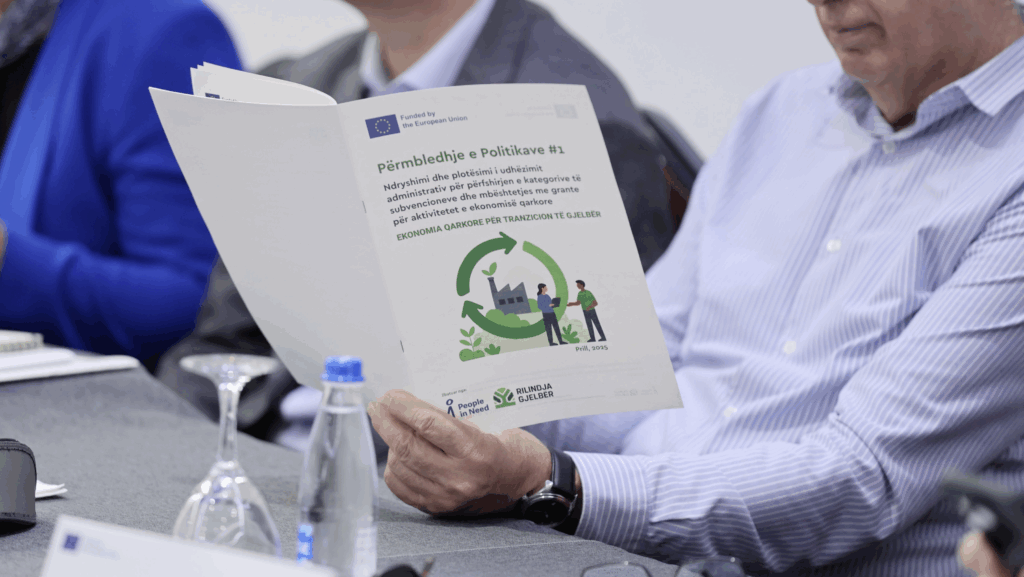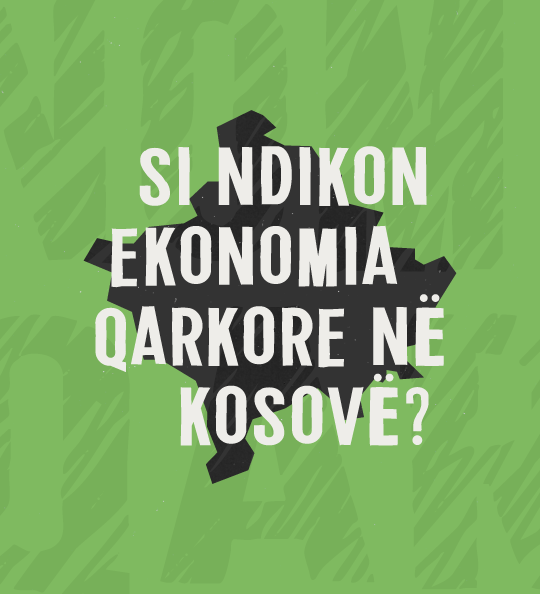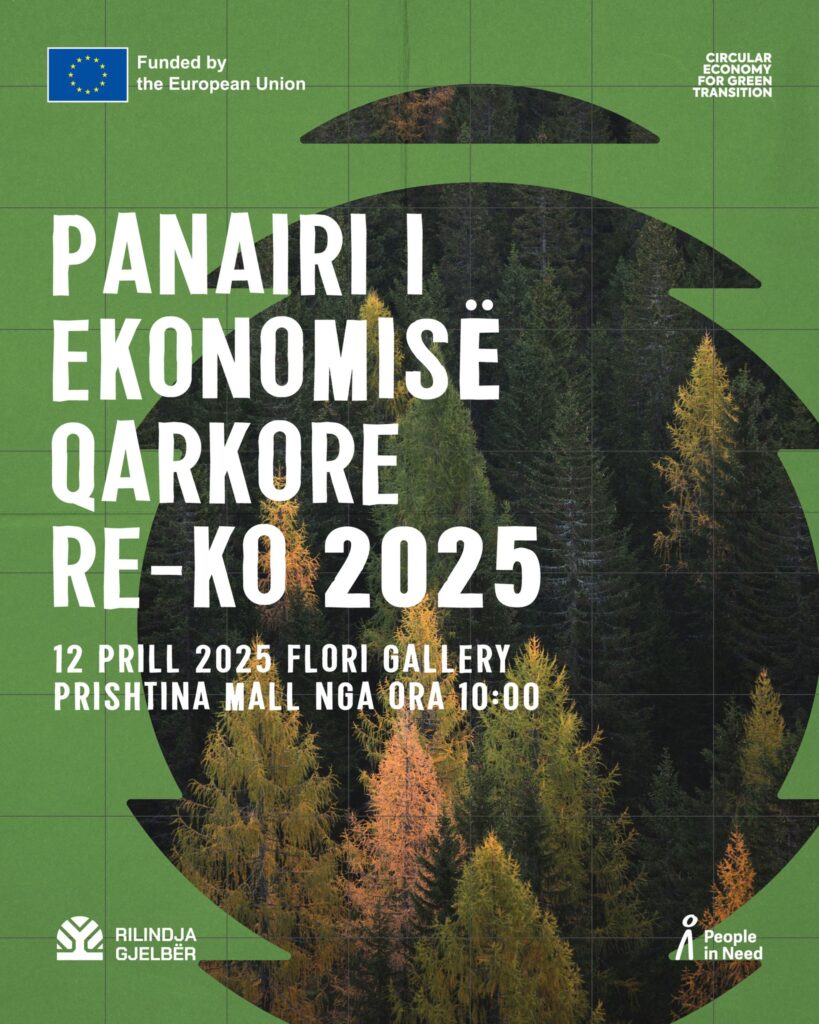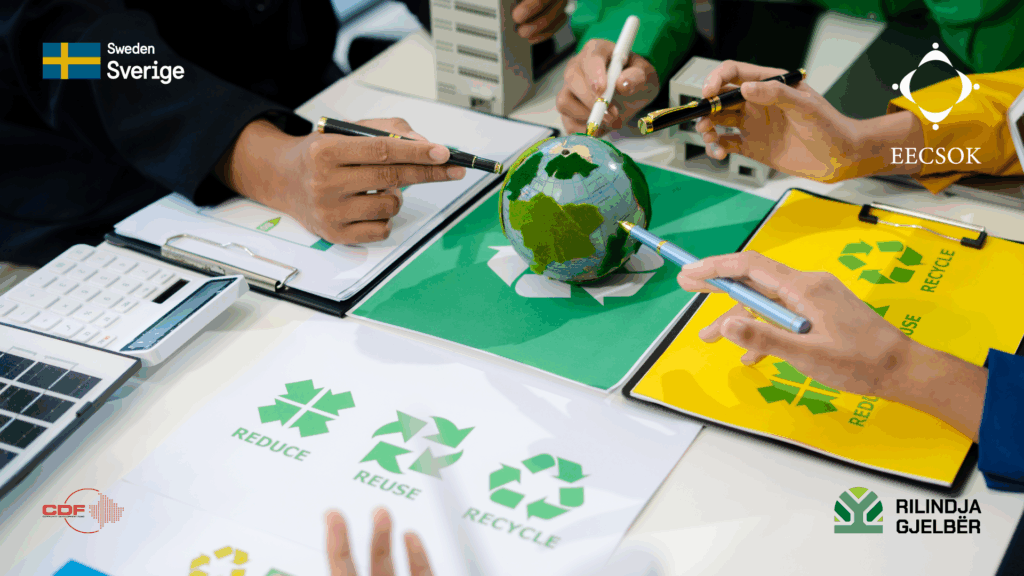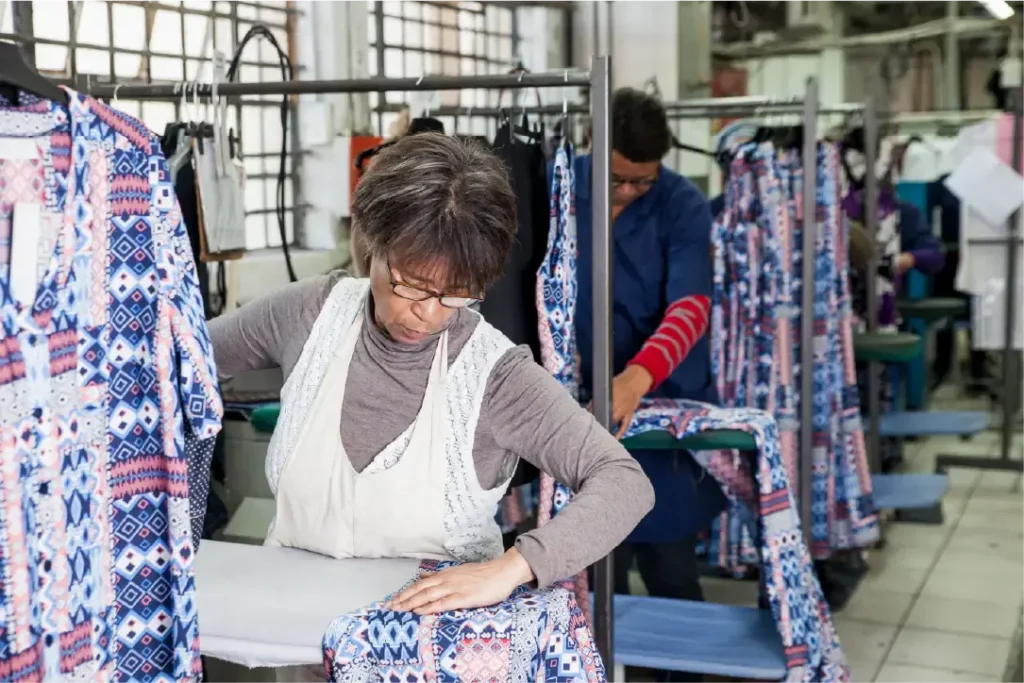Why does Kosovo need to implement Circular Economy practices?
Kosovo faces significant environmental, economic, and social challenges that can be addressed through a circular economy approach. Some of the key reasons why Kosovo needs to accelerate this transition include:
Introduction
Kosovo stands at a critical juncture where pressing environmental, economic, and social challenges demand systemic change. As the country grapples with mounting waste management issues, unsustainable resource consumption, and persistent unemployment, the circular economy offers a comprehensive solution that can address multiple crises simultaneously.
The circular economy is not merely a set of waste reduction strategies but a holistic economic model aimed at decoupling economic growth from resource depletion while promoting long-term environmental sustainability. Unlike the traditional linear model of “take, make, dispose,” the circular economy focuses on resource efficiency, reuse, recycling, and the regeneration of natural systems.
Given Kosovo’s fragile ecological and economic landscape, the transition to circular practices is no longer optional but a necessity to secure its environmental and economic resilience.
1. Environmental Degradation and the Crisis in Waste Management
Kosovo produces over 400,000 tons of municipal waste annually (Kosovo Environmental Protection Agency, 2023). Alarmingly, a substantial proportion of this waste ends up in unsanctioned landfills or is burned in the open, contributing directly to air, soil, and water pollution. Open dumping and burning of waste are known to release hazardous pollutants such as dioxins, furans, and particulate matter (PM2.5 and PM10), leading to respiratory illnesses and other health problems (World Health Organization, 2022).
Despite increasing awareness of environmental degradation, Kosovo’s recycling rate remains below 7%, far behind the European Union average of 47% (Eurostat, 2024). Moreover, the country lacks a nationwide waste separation system, which hinders the effective sorting and processing of recyclable materials.
Air quality is a particular concern, with Pristina, Obiliq, and Mitrovica consistently reporting pollution levels exceeding EU-recommended thresholds, largely due to emissions from coal-based energy production and industrial activity (UNEP, 2024). Water sources are equally threatened by the leaching of pollutants from unmanaged waste sites, impacting both biodiversity and human health.
The circular economy provides a viable framework to reverse this trend. The adoption of Extended Producer Responsibility (EPR) would make manufacturers responsible for the entire lifecycle of their products, encouraging design for recyclability and reducing waste generation. Furthermore, Kosovo could benefit from investments in waste-to-energy (WtE) plants and modern recycling facilities that reduce the country’s dependency on unsustainable waste disposal practices.
2. Overreliance on Imports and Unsustainable Resource Use
Kosovo is highly dependent on imported raw materials, energy, and finished goods, leaving its economy vulnerable to international price volatility and supply chain disruptions. According to the Kosovo Agency of Statistics (2024), over 80% of goods consumed in Kosovo are imported, including critical inputs for construction, manufacturing, and the energy sector.
The construction industry alone is one of the most resource-intensive sectors in the country, heavily reliant on imports of cement, steel, and other materials. This not only accelerates the depletion of Kosovo’s natural resources but also exacerbates the country’s trade deficit.
The circular economy emphasizes local resource loops, where materials are reused, remanufactured, or recycled within the domestic economy. For instance, reuse of construction and demolition waste (CDW)—such as bricks, aggregates, and metals—could reduce the need for virgin imports while cutting down on waste. Several EU countries, including the Netherlands and Finland, have successfully implemented circular construction practices, achieving material reuse rates exceeding 60% (European Environment Agency, 2023).
By developing domestic supply chains and promoting circular business models—such as repair, remanufacturing, product-as-a-service, and leasing—Kosovo could reduce its economic vulnerability and foster greater self-sufficiency.
3. Economic Benefits: Job Creation and Green Innovation
Kosovo continues to face high unemployment, particularly among young people, with youth unemployment rates exceeding 33% as of late 2024 (Kosovo Labour Force Survey, 2024). The current linear economic model does not provide sufficient opportunities for job creation in sectors that are compatible with the principles of sustainable development.
The circular economy, however, has the potential to create thousands of new jobs in sectors such as:
- Recycling and materials recovery
- Circular product design and remanufacturing
- Sustainable agriculture and food systems
- Renewable energy production (e.g., solar, wind, bioenergy)
- Green infrastructure and eco-tourism
Research conducted by the International Labour Organization (ILO, 2023) estimates that the circular economy could generate up to 6 million new jobs across Europe by 2030, and Kosovo could harness a share of this growth by prioritizing circular business models.
Training and reskilling the workforce to meet the demands of a circular economy is essential. Kosovo’s educational institutions and vocational training centers will need to offer programs focused on eco-design, resource efficiency, and circular entrepreneurship to prepare young professionals for this emerging labor market.
4. EU Integration and Alignment with the Green Agenda for the Western Balkans
As Kosovo works toward deeper integration with the European Union, compliance with EU environmental standards is essential. The Green Agenda for the Western Balkans—endorsed through the Sofia Declaration—positions the circular economy as a cornerstone of regional development and climate action (Regional Cooperation Council, 2020).
Failure to align with the EU Green Deal and related environmental directives could limit Kosovo’s access to critical funding opportunities, including the Instrument for Pre-Accession Assistance (IPA III) and other forms of financial support linked to the European Green Deal Investment Plan (European Commission, 2024).
The development of Kosovo’s Circular Economy Roadmap, supported by international partners such as UNDP and technical advisors including Deloitte and Circular Change, has outlined sectoral priorities including waste management, manufacturing, construction, and sustainable food systems.
Implementing this roadmap is crucial for Kosovo to meet its Nationally Determined Contributions (NDCs) under the Paris Agreement and to facilitate the green transition as required by EU accession processes.
Conclusion: A Path Toward Sustainability and Resilience
Kosovo’s environmental and economic challenges require urgent structural reforms that move beyond short-term solutions. The circular economy represents an integrated model capable of transforming Kosovo’s vulnerabilities into drivers of innovation, employment, and sustainable growth.
By investing in circular infrastructure, developing domestic supply chains, and fostering a regulatory environment conducive to resource efficiency and waste reduction, Kosovo can:
- Enhance its environmental resilience and reduce public health risks
- Lower its dependency on imports and strengthen its local economy
- Create green job opportunities for its growing workforce
- Align its policies with the European Green Deal and regional climate commitments
The circular economy is not only an environmental necessity but also a strategic opportunity for Kosovo to position itself as a regional leader in sustainability.
The time to act is now. A collaborative effort between policymakers, the private sector, civil society, and citizens is needed to build a circular and sustainable future for Kosovo.
References:
- Kosovo Environmental Protection Agency (2023). Annual Waste Management Report.
- UNEP (2024). Air Quality and Industrial Emissions in the Western Balkans.
- Eurostat (2024). Waste Management and Recycling Statistics.
- European Environment Agency (2023). Construction and Demolition Waste in Europe.
- Kosovo Labour Force Survey (2024). Ministry of Finance and Transfers.
- International Labour Organization (2023). Green Jobs and the Circular Economy.
- Regional Cooperation Council (2020). Sofia Declaration on the Green Agenda for the Western Balkans.
- European Commission (2024). Green Deal Investment Plan and IPA III Funding Guidelines.
- Kosovo Circular Economy Roadmap (2023), Ministry of Environment, Spatial Planning, and Infrastructure.

